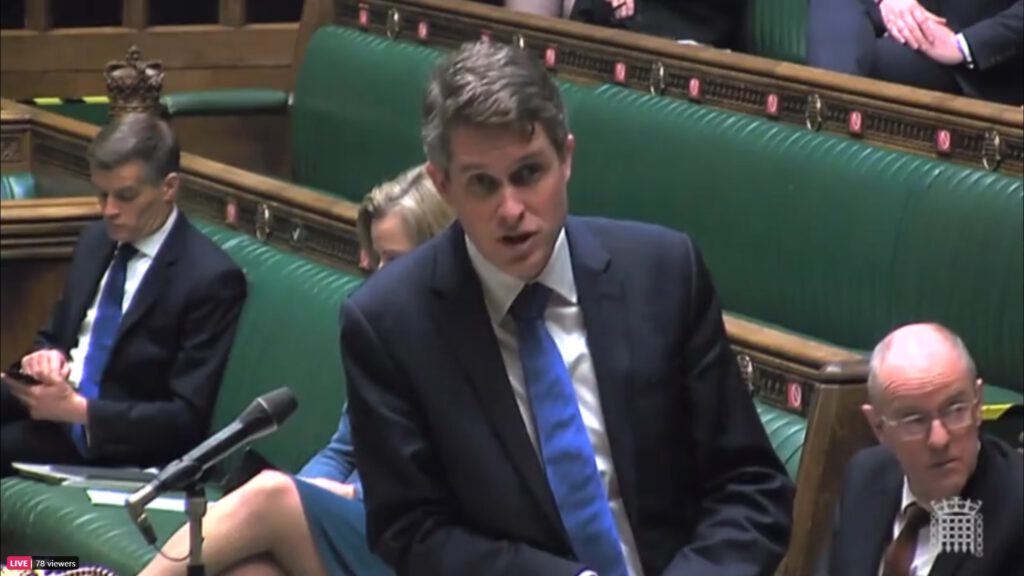Teacher Assessment, not Algorithms for 2021 GCSE and A Level Exams confirms Gavin Williamson

This afternoon (6 Jan), the Education Secretary, @GavinWilliamson, formally announced the suspension of #GCSE and #ALevel examinations in England.
This decision means that examinations in England have been suspended for the second time in less than a year – with teacher-led assessment and grading, again, determining the results of millions of students.
? Education Secretary @GavinWilliamson is making a statement on educational settings.
Watch live ⬇️ https://t.co/UIaABWh7t3
— UK House of Commons (@HouseofCommons) January 6, 2021
How has the FE and Skills Sector responded to the announcement:
 Association of Employment and Learning Providers (AELP), chief policy officer Simon Ashworth said,
Association of Employment and Learning Providers (AELP), chief policy officer Simon Ashworth said,
“For months, apprentices have been unable to complete their training programmes and progress their careers because teacher assessed grades have been denied to them since the summer. Instead of the government and Ofqual talking about different types of solutions for different forms of qualifications, we need a fair and consistent approach for all learners.
“The logjam of held-up apprentices builds by thousands week by week and so we need a really fast return to centre assessed grades which were not subject to abuse when used last year.”
 Kate Green MP, Labour’s Shadow Education Secretary, responding to the Education Secretary’s statement on the closure of schools, said
Kate Green MP, Labour’s Shadow Education Secretary, responding to the Education Secretary’s statement on the closure of schools, said
“Mr Speaker, months ago, the Education Secretary gave a cast iron commitment that exams would go ahead. At that moment, we should have known they were doomed to be cancelled.
“I wanted exams to go ahead fairly, but I was always clear that there must be a Plan B if that was not possible. For months, there was no sign of any such plan, although the risk exams couldn’t happen has always been entirely predictable.
“The Secretary of State said he will be providing support to teachers to award grades. Can he tell me when they will receive this support, what form it will take, and confirm that it will be available in all schools?
“And can he tell me exactly what will be done to ensure that all grades are fair, consistent, and support pupils to move on in their education or employment, including private candidates.
“He had nothing to say on technical and vocational exams this summer, and is frankly failing to show leadership on exams in January. Can he tell me what will happen this summer to exams other than GCSEs and A-levels, and will he now do the right thing and cancel this week’s BTEC exams as parents, colleges and the AoC are calling for?”
 Kirstie Donnelly, Chief Executive of City & Guilds said:
Kirstie Donnelly, Chief Executive of City & Guilds said:
“Great news – Thank you SoS for finally listening and taking this positive step forward in using Teacher Assessed Grades for 2021 exams, which we have to assume will now apply across vocational and technical exams too, thereby applying consistency as one approach adopted across the whole of the sector. We couldn’t possibly run two separate approaches -Generals versus Vocational – given the current situation, and in doing so we also avoid any sense of unfairness in how all of our students/learners are being treated regarding their exams, regardless of which route they have taken. This is a great step forward in creating real parity across the two pathways during these unusual covid times.
“Furthermore, this decision by the SoS will now help unlock the fortunes of hundreds of thousands of learners/students as they work to achieve their hopes and aspirations through both their General and Vocational exams, at the same time this decision will also help to now unlock the Functional Skills ‘lock jam’ that has been building up, ensuring thousands of Apprentices can also qualify and be out in their workplaces productively contributing to our collective futures.”
Association of Colleges responds to Education Secretary’s plans for A Levels and GCSEs
 Commenting on today’s statement from the Education Secretary, Gavin Williamson on the plan for students’ grades now exams have been cancelled, AoC’s Chief Executive David Hughes said:
Commenting on today’s statement from the Education Secretary, Gavin Williamson on the plan for students’ grades now exams have been cancelled, AoC’s Chief Executive David Hughes said:
“We welcome the Secretary of State’s decision to move to teacher assessed grades for this summer’s public exams and the trust that shows in teachers professional judgements – they are best placed to do this and AoC has been calling for this to be planned as a contingency since September. We believe that this could help address the different levels of disruption to learning which different students have experienced.
“We welcome the opportunity to work with the government, Ofqual, awarding organisations and other representative groups to develop a workable and fair system for all students across all types of general, applied general and vocational/technical qualifications. It is vital that the proposed way forward is consistent and fair to every student because of the worry and confusion which abounds currently, particularly following the mixed message that January exams are going ahead while this summer’s exams are cancelled.
“As well as young people, there are around 250,000 apprentices and 1 million adult students studying for qualifications in colleges. Decisions for all qualification types need to be made and communicated as soon as possible, so we welcome the speed at which the government has committed to work on this. Not only do the plans need to be fair, comprehensive, inclusive and robust; they also need to be agreed quickly, communicated clearly and be flexible enough to work in practice. Clarity is needed for students, but so is reassurance that they can trust the plans will be put into action and stuck to.
“This year’s system faces an enormous challenge of accounting for the differential disruption which students have already experienced over two academic years: differential lost learning time, differential access to digital devices and broadband off-site and the differential impact of sickness and self-isolation in different contexts. This is not easy to map, but it is clear that those who already face the biggest barriers to success are also the most affected by the impact of Covid-19. The pandemic has widened and deepened educational disadvantage gaps.
“There is an emerging issue too for students on licence to practice courses, who may not have been able to receive the level of training they will need to be able to show competency in their chosen field. This is a training as well as an assessment challenge which will need special attention urgently alongside the consultation.”
AoC asks for:
- A robust plan to be agreed as soon as possible for all qualification types with clear guidance for students, teachers and centres.
- A national system of centre-moderated assessment combined with national moderation.
- A special consideration process which allows centres to flag and quantify the level of disruption faced by students.
- The resources available in the exam support service to be targeted at providing access to digital devices and broadband for those students who lack access so they can fully access online learning opportunities.
- Urgent review of the lost training which licence to practice students have suffered which might hamper their ability to meet the competencies required in their chosen fields.
Commenting on today’s statement by the Education Secretary, Sir Peter Lampl, founder and chairman of the Sutton Trust, said:
“It’s good that the Education Secretary has given some clarity to schools, pupils and their families on assessments in 2021. The decision to cancel exams is the right one given the scale of disruption.
“However, teacher assessments are problematic in terms of their consistency across schools and potential bias. By this summer, pupils will have faced over a year of disrupted learning, which will have had a disproportionate impact on poorer students. It is crucial that any assessment model takes this into account so that all pupils leave education with the qualifications they deserve.”
“The commitment to providing at least 3 hours of education a day when schools are closed is welcome. But for this to be realistic for all pupils, the government must take urgent and ambitious steps to address the digital divide, including laptops and free data for disadvantaged pupils.”
 Commenting on the Education Secretary’s statement to the House of Commons, Dr Mary Bousted, Joint General Secretary of the National Education Union, said:
Commenting on the Education Secretary’s statement to the House of Commons, Dr Mary Bousted, Joint General Secretary of the National Education Union, said:
“Gavin Williamson said in Parliament today that he and Ofqual had prepared a contingency for teacher-assessed grades to award qualifications in summer 2021 but, if this is the case, why did he keep it from the sector? The NEU alongside other unions had called for structures to enable such a back-up option to exams in October. Had these structures been put in place then we would be in a much better position now to make it happen.
“Instead, there is a danger that implementing such a process fairly and consistently nationally at this late stage will lead to further extreme stress and workload for education staff, students and parents. This stress could have been avoided had government not been so obsessed and blinkered by their pursuit of exams in the face of the obvious prospect that they may not be fair or possible.
“Education staff will need further information soon about the training proposed by Gavin Williamson to assist with ensuring consistency and fairness of grades nationally. Students and parents will also want to understand how the process is fair for everyone across all types of qualifications – GCSEs, A-Levels, BTECs and others.
“There remains a willingness from the NEU to work with government to get the fairest possible outcome for students and find the best possible ways for schools and colleges to implement the process. We will take up his offer to discuss the details of these issues but government and Ofqual will need to be far more willing to act on what we suggest this time. We will also make clear that any further workload cannot be dumped upon an already grossly overstretched profession at this time.
“The decision to pass the buck to school and college leaders on January exams for vocational qualifications is a further demonstration of a lack of leadership from government. Awarding organisations who offer these courses have assured us that no student will be disadvantaged whether they take the exams in January or not and it is now incumbent upon them, Ofqual and government to explain, very soon, how this will come to be.
“We are glad that the Government has listened to the widespread calls for urgent action on tablets and data support for the remote learning of disadvantaged children, working with mobile phone companies. But it has not gone unnoticed that we have seen months of dither and delay. A move to rationing the supply towards the end of 2020 was a low point for school leaders who have been working desperately hard for the disadvantaged students in their care. Even so, by the Education Secretary’s own estimate the roll out of one million devices will not be reached until the end of January – two thirds of the way through the proposed period of lockdown. With a summer completely squandered by the Department for Education, it is galling that this should still remain an issue.
“The last thing teachers and heads need right now is the spectre of Ofsted, which has been of neither use nor ornament throughout the pandemic. It is sadly part of their DNA to criticise rather than offer solutions or real help. The best thing inspectors can do right now is offer their services, either as additional teachers or to supervise daily testing of those who will still be attending their school or college during this period of lockdown. That way we can allow heads and their staff to focus their efforts on what really matters – supporting their students, rather than the distraction of a visiting box-ticker.
“We still have no clarity on primary assessment. Delaying a decision on SATs just adds to the suspicion that yet again the government is intending to impose its own warped sense of priority on schools. This summer, schools will be totally committed to help pupils who will have experienced more than a year of learning disruption. SATs, with all the extra pressures they entail, are the last thing that schools need.”
 Commenting on the statement delivered by Education Secretary Gavin Williamson today that teacher assessed grades will replace GCSE and A-Level exams in 2021, Patrick Roach, General Secretary of NASUWT-The Teachers’ Union, said:
Commenting on the statement delivered by Education Secretary Gavin Williamson today that teacher assessed grades will replace GCSE and A-Level exams in 2021, Patrick Roach, General Secretary of NASUWT-The Teachers’ Union, said:
“In the context of the current lockdown and the level of disruption already experienced by pupils over the last nine months, cancelling exams is the only sensible course of action.
“However, we cannot risk a repeat of the chaos that engulfed this year’s exam results.
“Pupils and teachers now need urgent clarity and further detail of how the arrangements for teacher assessed grades will work.
“The Government has a huge job to rebuild the confidence of pupils, parents and teachers after last year’s debacle and it will be critical that the arrangements for how pupils’ skills and knowledge are to be assessed and graded are transparent, clearly communicated and vitally, that they ensure fairness for all pupils.
“Teachers are already under incredible amounts of pressure and stress as a result of the impact of Covid on schools and the Government’s chronic mismanagement of the pandemic. The arrangements adopted for assessing pupils’ grades must be developed in consultation with the profession and must keep workload and bureaucracy to a minimum.
“The Education Secretary says he is putting his trust in teachers by turning to teacher assessed grades, but he must also show them his respect by learning from the mistakes of the last nine months.”
Government threats to schools on remote learning ‘disgraceful’, says NAHT
 Responding to the Secretary of State for Education’s speech in the House of Commons today, Paul Whiteman, general secretary of school leaders’ union NAHT, said:
Responding to the Secretary of State for Education’s speech in the House of Commons today, Paul Whiteman, general secretary of school leaders’ union NAHT, said:
“Schools were told at 8pm on Monday night that they would to switch to remote learning by 9am the next day and to organise provision for vulnerable and key worker pupils. They have spent the last 48 hours working tirelessly to put plans in place, despite the fact that on Sunday the PM was saying that schools would remain open.
“Meanwhile pupils up and down the country are still awaiting the internet devices that were promised last summer. We’re into the ninth month of the pandemic and many schools and pupils are still waiting for their allocation to come through. And devices are only being made available for older primary pupils, not those in key stage 1 at all. The government really has really let young people down miserably on this one.
“It is therefore nothing short of disgraceful that the government should choose today to start threatening schools about the quality of their remote learning offer. Schools are keeping going in the most extreme circumstances right now – support is needed to overcome the challenges they face, not threat or sanction.
“The profession has predicted all the difficulties the government has failed to navigate schools through. I therefore appeal again to government to work alongside the profession constructively in place of threats and empty words. The announcements today do nothing to redress the damage the government has caused to children’s education.”
New arrangements for GCSE and A Levels must give students hope
Paul Whiteman, general secretary of school leaders’ union NAHT, continued: “The government’s last-minute approach has not worked for students throughout the pandemic so whatever solution the government comes up with it needs to be arrived at rapidly. It must command the confidence of everybody it affects: students, school staff, parents, universities and employers.
“The government must be prevented from repeating the mistakes of last year and provide students with two things: the reassurance that plans for 2021 will be something they can have confidence in, and a sense of hope their studies this year will still be meaningful.
“We have been told that grades will be awarded through teacher assessment with training and support provided to ensure fairness and consistency. But there is no detail. It is vital that the government and Ofqual engage with the profession immediately to develop a process which works and avoids the chaos of last year.
“Little consideration has been given to students due to take exams this month. Pushing the decision about whether or not to hold these exams onto schools and colleges is unacceptable. No answers have been given as to how grades will be awarded where students or education providers decide it is not safe or appropriate to continue with them.”
Education Policy Institute responds to Secretary of State’s statement on the cancellation of exams and their replacement
 Commenting on the decision to cancel exams and establish an alternative system of assessment, Natalie Perera, Chief Executive of the Education Policy Institute (EPI), said:
Commenting on the decision to cancel exams and establish an alternative system of assessment, Natalie Perera, Chief Executive of the Education Policy Institute (EPI), said:
“We welcome the confirmation that 2021 GCSE and A level exams will not now go ahead. The loss of learning during the pandemic has affected children in such a varied way that the existing exam system could not have been fair.
“Devising a robust alternative to award grades will not be easy, and it is right that some time is now being taken to reflect and consult. Today’s statement was notably short on detail, particularly if contingency plans on exams have already been prepared, as the Secretary of State suggested.
“The government and Ofqual now need to act with some speed, so that students and schools can quickly adapt to the new expectations. The new system needs to be fair, command student and public support, and create incentives for pupils to go on learning for the rest of the school year.”
 David Laws, Executive Chairman of the Education Policy Institute (EPI), said:
David Laws, Executive Chairman of the Education Policy Institute (EPI), said:
“The new schools lockdown made this step inevitable. Had exams proceeded as normal, the results would have told us just as much about the varied effects of the pandemic on students’ learning as it would about their own abilities and efforts.
“The Department for Education and Ofqual now face one of the most difficult education policy challenges in recent times, in getting a replacement system of grading up and running in a very short time.
“Meanwhile, it’s essential that the government focuses on what more it can do to support home learning and catch up. A much bigger and better targeted package of financial support will soon be needed to support schools in catch up learning both this year and next.”
Teachers must be consulted in new assessment plans
Eleanor Harrison, CEO of education charity Impetus said:
“Prompt clarity on the exam plans is welcome, but important details must not be missed in the rush to clear up this week’s confusion.
Many pupils from disadvantaged backgrounds have found the move to online learning challenging – with a lack of hardware, reliable access to the internet or a quiet place to study – and this group must be front of mind as new exam plans are agreed.
Ministers have to do everything they can to support these pupils to progress successfully to the next stage in their education or into working life. Young people who miss out on crucial GCSEs at 16 are less likely to go to university, less likely to get a job, and unlikely to catch up at college. This is a pivotal moment in a young person’s life.
The views and expertise of teachers, who know and understand pupils and their needs, must be embedded in the programme design. The future of hundreds of thousands of students rests on these plans. The plans must be considered and stress tested; we must avoid the chaotic last minute changes of 2020 – the stakes are too high.”
Commenting on the confirmed suspension of school and university examinations, academic, innovator and Axiologs education services CEO, Professor Keith Straughan, said:
“Given the recent surge in COVID-19 infections, the decision to suspend this year’s GCSE and A-Level examinations does not surprise.
“However, as we saw last summer, the wholesale suspension of examinations can have an extremely damaging impacts on students.
“The Government, which has repeatedly pushed schools and universities to utilise online learning technologies during the pandemic, should now consider the merits of remote examinations for students.
“With world-leading digital platforms, such as Tenjin, now available, government figures should now encourage the adoption of remote examinations, wherever possible, so that students and teachers can gauge progress and work towards some semblance of normality in this otherwise difficult time.”
Gavin Williamson statement to Parliament on closure of education settings during national lockdown
With permission, Mr Speaker, I would like to make a statement regarding schools in national lockdown.
The last thing any Education Secretary wants to do is announce that schools will close and this is not a decision that the government ever wanted to take.
I would like to reassure everyone that our schools have not suddenly become unsafe, but limiting the number of people who attend them is essential when the COVID rates are climbing as they are now. We must curb the escalating cases of COVID throughout the country and prevent the NHS from being overwhelmed. That is why today I am setting out the contingency plans I had prepared but had hoped to never have to implement.
I would like to thank all our teachers, all our education staff and social workers for all they have been doing to keep children and young people safe and learning.
During lockdown, early years settings remain open nationally to all, providing vital early education and childcare. Schools will be open too for vulnerable children and children of critical workers.
Those at university will predominantly study online, although there are a small number of exceptions including those studying medicine, healthcare and education.
Unwelcome though this latest lockdown is, and I am very conscious of the real challenges parents are facing with their children at home, we are far better placed to cope with it than we were last March. We are now better prepared to deliver online learning. This is an important step forward in supporting children to make the progress they so desperately need and we will also do what we can to help their parents. I would like to say thank you to all those parents and carers who are having to step up once more to take on the challenges of home learning.
We have set out clear, legally binding requirements for schools to provide high-quality remote education. This is mandatory for ALL state-funded schools and will be enforced by Ofsted. We expect schools to provide between three and five teaching hours a day, depending on a child’s age.
If parents feel their child’s school is not providing suitable remote education they should first raise their concerns with the teacher or headteacher and failing that, report the matter to Ofsted.
Ofsted will inspect schools – of any grade – where it has serious concerns about the quality of remote education being provided.
We have also been significantly stepping up the digital support we are providing to schools and parents. The fantastic Oak National Academy continues to provide video lessons for all ages across all subjects and yesterday the BBC announced it will be delivering the biggest push on education in its history, bringing 14 weeks of educational programmes and lessons to every household in the country.
Our delivery of laptops and tablets continues apace. We have purchased more than one million laptops and tablets and have already delivered over 560,000 of these to schools and local authorities, with an extra 100,000 this week alone. By the end of next week we will have delivered three quarters of a million devices.
We are also working with all the UK’s leading mobile network operators, to provide free data for key educational sites. We are very grateful to EE, Three, Tesco Mobile, Smarty, Sky Mobile, Virgin Mobile, O2 and Vodaphone for supporting this offer. We have also been delivering 4G routers to families who need to access the internet.
Another area where we have learned lessons is on exams. Last year, all four nations of the UK found their arrangements for awarding grades did not deliver what they needed, with the impact felt painfully by students and their parents. Although exams are the fairest way we have of assessing what a student knows, the impact of this pandemic now means that it is not possible to have these exams this year. I can confirm that GCSEs and A and AS Level exams will not go ahead this summer. This year we are going to put our trust in teachers rather than algorithms.
The department and Ofqual had already worked up a range of contingency options. While the details will need to be fine-tuned in consultation with Ofqual, the exam boards and teaching representatives, I can confirm now that I wish to use a form of teacher-assessed grades, with training and support provided to ensure these are awarded fairly and consistently.
I know students and staff have worked hard to prepare for the January exams and assessments of vocational and technical qualifications, and we want to allow schools and colleges to continue with these assessments where they judge it is right to do so. No college should feel pressured to offer these and we will ensure all students are able to progress fairly, just as we will with VTQs in the summer.
I know there is, understandably, concern about free school meals. We are going to provide extra funding to support schools to provide food parcels or meals to eligible children. Where schools cannot offer food parcels or use local solutions, we will ensure a national voucher scheme is in place so that every eligible child can access free school meals while their school remains closed.
Finally I would like to turn to our programme of testing for the virus. There has been a brilliant, concerted effort in secondary schools and colleges to deliver testing for the start of this term and none of the work done to roll this out is going to be wasted. Regular testing will take place of staff and students in school and, in due course, help us to reopen schools as soon as possible. Testing is going to be the centre of our plans to return children back to school back to the classroom and back to college as soon as possible.
Mr Speaker, I never wanted to be in a position where we had to close schools again. I believe that schools should always have their gates open welcoming children and always being at the heart of their community. The moment that the virus permits, all our children will be back in school with their teachers and their friends. But until then, we have put in place the measures we need to make sure that they continue to progress and for this reason I commend this statement to the House.











Responses